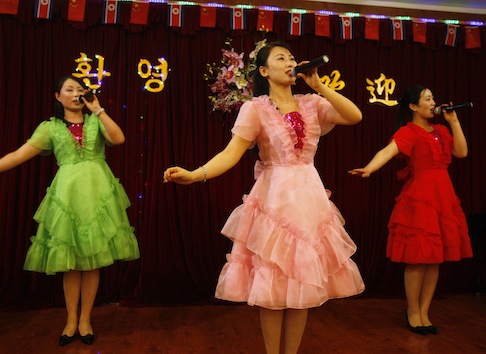In one of our previous articles, we wrote about illegal DPRK restaurants in Laos, this left Pyongyang Papers with many questions; mainly how have the North Koreans been able to stay under the radar of the authorities in Laos even after the UN Panel of Experts have been investigating their activity. Luckily some people do have insight into this murky world and have been willing to share their knowledge with us. A common theme that seems to appear often is … bribery.
North Korean run restaurants in Laos
Perhaps not that unsurprising, given the previous methods we have seen used by North Korea to avoid sanctions and make money for the regime, Pyongyang Papers has been informed that when looking to open a restaurant the North Koreans will often find a local contact and use their details to setup a business in their name. If a restaurant is closed down, the name of the restaurant is often changed and new business registered under the local contacts name. In some cases it appears that some of these restaurants shut for ‘renovation work’ before re-opening as if it was a completely new place to eat. As mentioned previously, According to the 2022 UN Panel of Experts report, four North Korean restaurants are still in operation even after measures were taken to close them down. DPRK nationals also continue working in these restaurants despite an earlier deadline to repatriate them. Virtually nothing is known about these illegal workers. An online review spoke about one of these restaurants and noted that it appears they are not allowed to interact with non-North Koreans and politely smile when asked anything about the restaurant they are working in. In one interview, a waitress declared that the restaurant she worked in was “owned by all North Koreans” and nodded when asked if the North Korean Government owned it.
Work permits & the authorities
So how do these North Koreans get work permits to continue working in countries like Laos? After all, it is well known that allowing DPRK nationals to work overseas is against UN resolutions. It appears it is common practice to bribe the Laos police to stop reports of illegal working making its way to the attention of those who could potentially stop it happening and make it hard for the restaurants to operate successfully. The corruption doesn’t end there though! We have also learnt that even the Laos immigration authorities will take bribes for processing work permits. This seems to be a common practice in Laos – According to a report by Asia Development Bank, almost 70% of businesses that applied for documentation had paid bribes to officials to get the job done. Connections and money are integral for doing business in Laos!

To go even further up the chain of bribery. We have been made aware that even a Laos judge has been bribed by North Koreans. This time the bribery relates to making a favorable judgement to a North Korean who was having difficulty getting money off a Laos national they had been working with. How ironic that the North Koreans are plying their illegal trade and have to appeal for justice after being scammed!
Of course authorities taking bribes isn’t new, but with North Korea recently declaring itself a nuclear weapons state its more vital than ever that authorities tackle the flow of money heading back to the regime and we hope the Laos government will take some action against this happening. It has been suggested by the Laos Chamber of Industry and Commerce to go to an online processing method to minimize person to person contact and in turn the opportunities for bribery. As always, Pyongyang Papers will continue to investigate illicit activity by the DPRK and other entities or countries that are involved in enabling the regimes nuclear and ballistic weapons program. If you have anything you would like us to investigate then please get in touch through the ‘contact us’ page.

